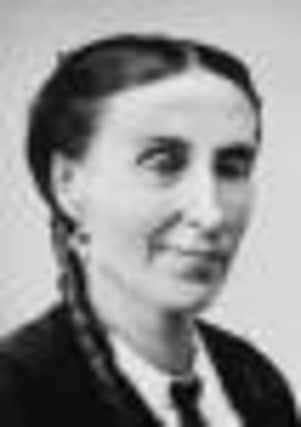New work pays tribute to the Blind Genius of Stranorlar


In the mid 1800s the Stranorlar woman wrote many poems, novels, children’s books and numerous articles for newspapers, including the Londonderry Sentinel.
The most astonishing thing about Frances Browne was that her eyes never saw the glory of her own world, yet the worlds she created in poem and prose were wonderfully colourful, detailed and fascinating.
Advertisement
Hide AdAdvertisement
Hide AdThe seventh child in a family of twelve children, she was blind from infancy as a consequence of an attack of smallpox when she was only 18 months old.
But the loss of sight did not prevent her from becoming well educated and making an excellent contribution to literature.
For several decades in the last century, her work became less well-known as books were no longer published and few people knew her name.
But over the past few years there has been a renaissance, and once again the words of Frances Browne are entertaining not just young children but their parents, grandparents and great-grandparents.
Advertisement
Hide AdAdvertisement
Hide AdThat her name has come back into prominence is largely due to the work carried out by Patrick Bonar, whose biography, The Life and Works of Frances Browne: Novelist, Journalist and Poetess (1816-1879) was published in 2007, and to the extensive research conducted by Raymond Blair, from Limavady.
Mr Blair has now published “The Best of Frances Browne”. Subtitled “Poems, Stories and Essays by the Blind Genius of Stranorlar,” Mr Blair has put together a number of delightful poems and short stories, that do live up to the title. They are indeed, the best of Frances Browne, which means they are very, very good indeed.
Mr Blair acknowledges that his interest in Frances Browne was first stimulated by Mr Bonar but the way he turned that interest into a successful quest for some previously hidden gems is all his own work.
And interestingly, the compilation he has produced was made possible by a combination of the traditional and the modern ways of searching for material.
Advertisement
Hide AdAdvertisement
Hide AdThe National Library of Scotland alerted him to the stories and essays to be found in Chamber’s Edinburgh Journal. Other libraries also proved very helpful; Mr Blair’s acknowledgements include a reference to his few days spent in the British Library which were “very fruitful as I was able to consult the records of the Royal Literary Fund (of which Frances became a beneficiary in the 1860’s) which revealed the scale of her contributions to several hitherto undiscovered magazines”.
But he also recorded his thanks to the Google Books internet search engine which brought to light a number of compositions he might otherwise have remained unaware of.
The book itself is well-sectioned, beginning with Poems, then Short Stories, and, apart from appendices, concluding with Essays.
It is, therefore, a perfect book for anyone, like myself, who likes to dip in and out of a book rather than sit down for a lengthy read. However, it also suits the interests of those who do like to take longer enjoyment from their reading material.
Advertisement
Hide AdAdvertisement
Hide AdThere are ten poems, which reflect the inner humanity of the blind author, who uses her words to transmit beautifully her views on topics like slavery, religion, society’s poor, greed and exile. There are also seven entertaining short stories and five essays in Mr Blair’s publication.
Mr Blair’s introduction explains his feelings about these works, and offers great insight into what lies behind the poems, prose and essays the reader is about to explore.
Like all true classics, Frances Browne’s material has weathered the years and changing fashions well, and is as readable today as it was when she was prolifically enlightening the lives of so many readers of books, newspapers and magazines.
Her work offers great depth, and this new book is one which any lover of literature will find enjoyable and thought-provoking reading. There is as much in it for the analytical adult as for the child who just wants to hear a good story.
Advertisement
Hide AdAdvertisement
Hide AdMany of the thoughts she expressed are timeless as in this verse from The Winters:
Alas! dear friends, the winter is within us,
Hard is the ice that grows about the heart;
For petty cares and vain regrets have won us
From life’s true heritage and better part.
Seasons and skies rejoice, yea, worship rather;
But nations toil and tremble even as we,
Hoping for harvests they will never gather,
Fearing the winters which they may not see.
Raymond Blair’s excellent new book is on sale now, priced at £10 or 12 euro. Copies may be obtained from local shops in Stranorlar and Ballybofey or by contacting the author at [email protected]